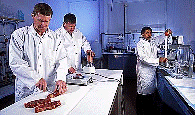United States Department of Agriculture: Agricultural Research Service, Lincoln, Nebraska

Roman L. Hruska U.S. Meat Animal Research Center: Reports
Date of this Version
2013
Document Type
Article
Citation
J. Anim. Sci. 2013.91:537–552 doi:10.2527/jas2012-5784
Abstract
Many traits affecting profitability and sustainability of meat, milk, and fiber production are polygenic, with no single gene having an overwhelming influence on observed variation. No knowledge of the specific genes controlling these traits has been needed to make substantial improvement through selection. Significant gains have been made through phenotypic selection enhanced by pedigree relationships and continually improving statistical methodology. Genomic selection, recently enabled by assays for dense SNP located throughout the genome, promises to increase selection accuracy and accelerate genetic improvement by emphasizing the SNP most strongly correlated to phenotype although the genes and sequence variants affecting phenotype remain largely unknown. These genomic predictions theoretically rely on linkage disequilibrium (LD) between genotyped SNP and unknown functional variants, but familial linkage may increase effectiveness when predicting individuals related to those in the training data. Genomic selection with functional SNP genotypes should be less reliant on LD patterns shared by training and target populations, possibly allowing robust prediction across unrelated populations.

